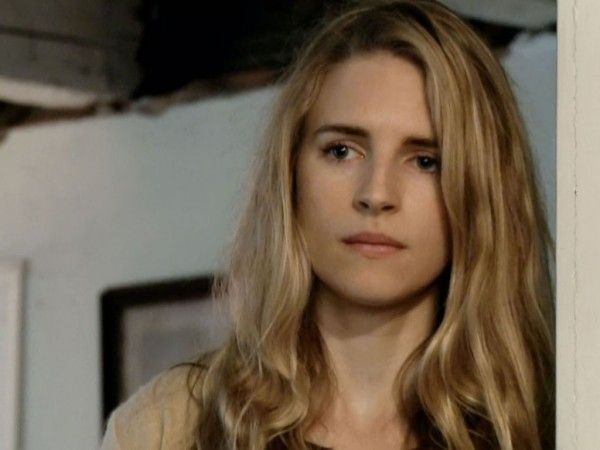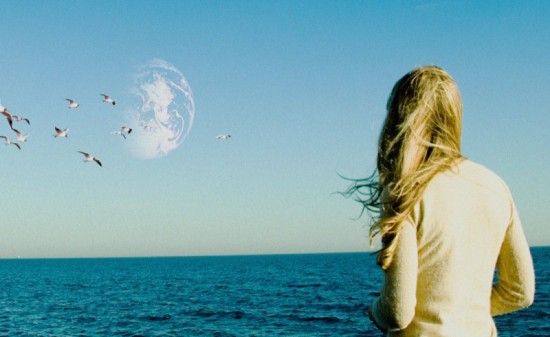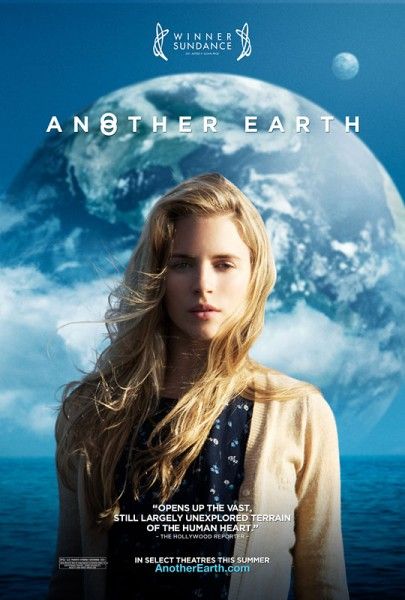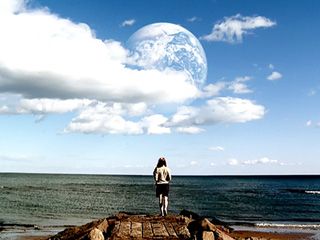In the unique and thought-provoking sci-fi drama Another Earth, actor William Mapother plays renowned composer John Burroughs, a man who has suffered a terrible tragedy that has left him disconnected, mistrustful and full of doubts about who he is. Then he meets Rhoda Williams (Brit Marling), a young woman with a horrible secret, searching for a way to right an unforgivable wrong. When Rhoda gets the chance to travel to Earth 2 – a mysterious yet mirror planet that has appeared in the sky – it forces her to expose the hidden truth between her and John, derailing the risky love affair that they have found themselves in.
At the film’s press day, William Mapother did this exclusive interview with Collider, in which he talked about how he came to this provocative indie film, his desire to rehearse and rewrite his scenes with the filmmakers once he was cast, the need to ground the sci-fi aspect of the film as much as possible in order to keep the relationship real, learning to play the musical saw for the role, the relief in knowing that people seeing the film are responding in the same way that he did when he read the script, and that he would take the opportunity to go to Earth 2 himself, with the stipulation that it could be a round-trip experience. He also talked about his upcoming roles in the comedy FDR: American Badass! (about FDR fighting werewolves), Edwin Boyd and A Warrior’s Heart (with Twilight stars Kellan Lutz and Ashley Greene), and what it was like to have been a part of the television series Lost. Check out what he had to say after the jump:
Question: Since they started filming without casting your role, how did you get involved with this film?
WILLIAM MAPOTHER: In the summer of 2009, I was at the Shakespeare lab at the public theater in New York. They do Shakespeare in the Park, and every year they bring in 12 actors with the best classical acting teachers in the country and they teach them, soup to nuts, how to play Shakespeare. While I was in New York, I thought I might as well meet casting directors whom I hadn’t met before, so I came up with a list, sent it to my representatives, and they set up some meetings. One of them was at Chelsea. The elevator was out, it was a fourth floor walk-up and the casting director was sharing an office with someone. It was noisy, dusty, loud and inauspicious.
Two weeks later, a script arrived in L.A. saying, “We have a director who’s never made a feature, an actress who’s not in the Guild and really hadn’t worked a lot, and there’s no money. Would William be interested?” And, I read the script and thought, “I’ve never read a story like this, and I’ve never played a character like this,” and I saw the footage that (director) Mike [Cahill] and Brit [Marling] had shot and thought it was terrific. And then, I met Mike and Brit, and I realized they’d be great to work with. I said, “Guys, I’ll come aboard, if we can meet for about a week or a week and a half, and rewrite my scenes, rehearse them and workshop them,” and we did. We met at my house for a week and a half, and it proved to be a godsend because we had a terrific bond, by the time we started shooting.
What sort of changes did you want to make to the character?
MAPOTHER: I just felt that the relationship between John and Rhoda could do with some closer examination. I just felt that with the arc of their relationship – because it starts in one place and moves to a very, very different place – there were some details and some calibration that it could benefit from. Their attitude was, “We want it to be as good as it possibly can, absolutely.”
How did you go about approaching this very real feeling of grief, in this very unreal setting?
MAPOTHER: We knew, from the very beginning, that we wanted to ground the science fiction aspect of the movie as much as possible, and the way it seemed best to do that was to make the relationship between John and Rhoda as believable as possible. If that’s grounded, then you accept it as our world with this new feature, as opposed to a totally new world that has a couple characters in it. So, we wanted the individual moments to feel as real as possible, and that would lead us to not trying to force the characters into a formula by forcing them to behave in a way that we thought the audience might expect. Based on my own experiences with grief and others I spoke to and some imagination, it seemed that a character who had lived in that house, in that condition, and had chosen that house, which was not only in a secluded area, but had a large yard around it as a buffer, wouldn’t be someone to so quickly socialize and verbalize his thoughts and feelings. He would have to be drawn out.
Had there always been so little dialogue between your characters?
MAPOTHER: There was never a lot of dialogue, in those early portions, and we decided to keep it that way. It made sense that it would be that difficult for John to begin communicating. It was also fun, as an actor, to play scenes without dialogue and to be able to use your body to express yourself. Now, so often in television and film, they move in for close-ups so quickly and your face becomes like a shampoo bottle and you’re a talking head, so it was fun to do some scenes that didn’t have dialogue.
You’ve had a lot of luck working with first-time filmmakers, but this is one of those stories that is so complex for such a small film. Is there something you look for to gauge a script from a first-time filmmaker?
MAPOTHER: It is very difficult to make a good movie, and I can’t tell if it’s going to be a success or not. I worked in script development, many years ago, and read a lot of scripts. Between that and the scripts I’ve read as an actor, and I’m a writer as well, I think I have a pretty good sense about whether the bones of a story are there and whether the structure is intact. As to whether or not that will make a good movie, you really don’t know until you put the movie together, but you can tell whether or not it has a shot at being a good movie.
How much of a challenge was it to film something so high-concept, and yet still so intimate?
MAPOTHER: Well, there is a challenge. For me, I didn’t have to confront that challenge because my job was mostly on the ground, at kitchen sick drama level, when you just play the scenes realistically. The challenge was for Mike and Brit, creating the story, and then Mike trying to bring it all together in post-production. But, the one thing the three of us were focused on, when we were rehearsing things at my house, was that the relationship between John and Rhoda should be as specific and detail-oriented and believable as possible. The more believable that was, the more believable the other Earth becomes.
How did you go about identifying with somebody so shut off and despondent with everything? Were there things that you were able to key into with him?
MAPOTHER: I guess every actor has certain emotions they can access easier than others. I don’t know if I’ve been doing it long enough to know which ones are easier for me. At certain points in my life, certain things would be easier than others. You have to find some parallel. Every actor has their own method, so I’m not suggesting what works for me will work for everybody else, but if you can find a time when you’ve experienced grief, in the example of what John goes through, then it’s simply a matter of magnifying that. You’ve experienced some grief over the loss of a pet, or the loss of a job, or something. If you can find something like that, then you try to extrapolate from that what it would be like, if that were compounded 10 or 100 times.
Was it easier to maintain the levels of that emotion, getting to shoot this mostly chronologically?
MAPOTHER: It was easier because it was chronological. I’m also lucky that Mike edited it well because we gave him a lot of takes. It’s very possible that, in the hands of someone else, they might have chosen takes that didn’t show John’s emotional arc as well as Mike did. We did a lot of takes. One of the advantages of shooting digitally was that we had a lot of time. When you shoot, even if you do a good performance, it may get lost in the editing room. It’s just one more way that a potentially good film might go astray.
Did you ever think that you’d have to learn to play a musical saw in your lifetime?
MAPOTHER: I never imagined that. Of all the things I expected to do as an actor, like shoot a gun, ride a horse or drive a car really fast, I never thought playing a musical saw would be one of them, and that’s a testament to the film. It sounds a little bit odd to use the word authenticity, but in a sense, that’s what it is. It makes sense within the character. It is an oddity of the sort that feels real.
What was it like to work with Brit Marling and collaborate with her on creating this relationship?
MAPOTHER: It was wonderful. It was very easy. She and Mike and I spent a week and a half at my house, and we were immediately comfortable with each other. They didn’t show any territorialism about the script they had already written. They were willing to examine it, from top to bottom, to make the project as good as it could be. Brit is bright, very committed, hard working, emotionally available, fun and quick to laugh. There may have been an actor trick or two that I may have shown her, that she wasn’t above acknowledging and using herself. It was just a joy to work with people in which ego and status were completely absent from any of their decision making.
Because this was such a small film and you never know how the finished product is going to turn out, has it been rewarding to have the response that you’ve had with it, and a relief to know that people are seeing the same thing in it that you did when you read it?
MAPOTHER: That’s an interesting question. It is a relief. I’ve made a number of independent films that didn’t receive theatrical distribution, that a lot of people haven’t heard of, and as a result, I’ve conditioned myself to go into small independent films with the expectation that they will not, and therefore, I have to find my reward elsewhere. So, the reward is in making the process enjoyable and feeling I’ve done my best. Even the quality of the finished film is out of my hands. In this case, the process and the feeling that I had done the best I could were both present, so the fact that the film turned out well and the fact that it’s getting attention now, including the purchase from Fox Searchlight, is all icing. If that became the primary reason I did independent films, I’d be unhappy, 99 times out of 100. You’d be setting yourself up for disappointment.
In doing something with this subject matter, did you think about what you would do if there was a parallel universe that you were also living on, and if you’d want to see what it was like?
MAPOTHER: I did. Once I got involved with the project, things moved pretty quickly, so I focused on how John might think about those things. Since then, it’s been fun to think about it myself. Brit and Mike and I have never gone out for a drink and talked about what our thoughts were, and I’d like to do that. When we were shooting, I tried to avoid co-mingling my thoughts with how the character might think, but I absolutely thought about how John would react, and it made sense to me that he would react with fear because it’s the unknown and the unknown is what got him into what he’s in now.
Would you go to Earth 2, if you had the opportunity?
MAPOTHER: Yes, with the stipulation that it be round-trip, so I could come back if I wanted ‘cause I don’t know what that William is going to be like.
You’ve done so many intriguing roles, in film and television, throughout your career. What’s it like to have been a part of Lost and to always be remembered as part of TV history?
MAPOTHER: I feel honored. I really do. It feels flattering to have people come up and essentially say, “We like your work,” even if they’re not saying exactly those words. I feel honored to have been a part of something that proves that large audiences will watch challenging material. I feel honored to be a part of something that provided people with entertainment and that inspired conversations. I feel very, very fortunate.
What is FDR: American Badass! about?
MAPOTHER: It’s a comedy about FDR fighting werewolves. It’s a silly concept, but if approached with the right tone, that sort of thing can be funny. One of the great things about film is that, typically anything that’s introduced in the first five minutes, the audiences will by into. A school for witches? Flying unicorns? I’m in, if it’s introduced early enough. That’s one of the powers of this film. If that alternate reality is introduced early enough that you’ll take it on. So, that’s one of my upcoming projects.
And what is Edwin Boyd?
MAPOTHER: That is based on a real infamous Canadian bank robber. Around 1950, he used to dress up in the dashing manner of Errol Flynn, and people like that. And then, I have another one where I play a lacrosse coach, called A Warrior’s Heart.
Having done so many different types of things, what interests you and excites you about projects that you’re looking at and deciding on?
MAPOTHER: Things that scare me, challenge me, and that I haven’t done before. Otherwise, I get bored and, if I get bored, I’m not doing my best work.




